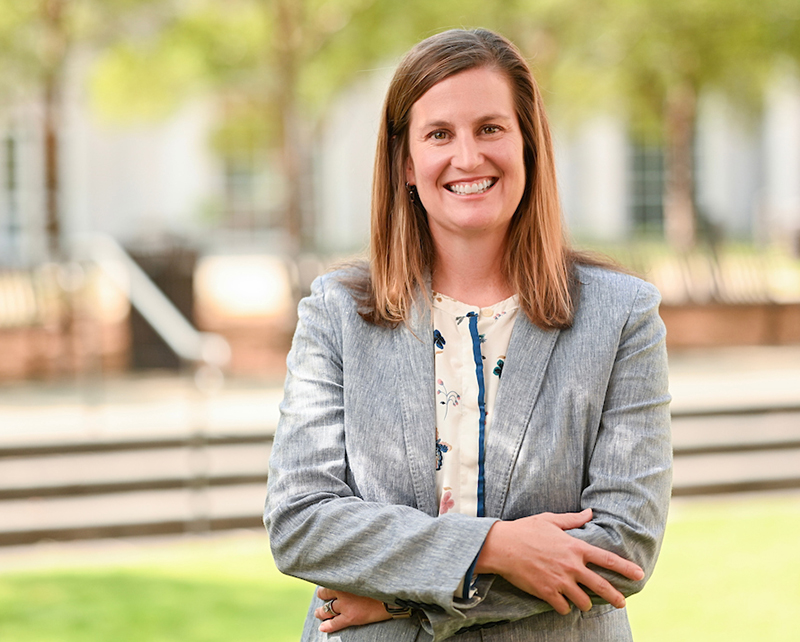What are the differences between using Excel spreadsheets and Access database, and
why should accounting students want to learn how to use Access? Therese Viscelli, Visiting Assistant Professor in the School of Accountancy at Harbert College, co-authored a case study that explains why.
 “Building Skills in Data Analytics: Bridging the Gap Between Spreadsheet Modeling and
Database Querying,” goes in-depth about Access queries, how they can be applied to business situations,
and how students can learn to create them. Not only was it recently accepted for publication
in “Issues in Accounting Education,” the premier journal for educational issues in accounting, but it also earned the
Outstanding Education Case Award Sponsored by the Institute of Management Accountants
in January at the American Accounting Association Accounting Information Systems Section
Midyear Meeting in Houston, Texas.
“Building Skills in Data Analytics: Bridging the Gap Between Spreadsheet Modeling and
Database Querying,” goes in-depth about Access queries, how they can be applied to business situations,
and how students can learn to create them. Not only was it recently accepted for publication
in “Issues in Accounting Education,” the premier journal for educational issues in accounting, but it also earned the
Outstanding Education Case Award Sponsored by the Institute of Management Accountants
in January at the American Accounting Association Accounting Information Systems Section
Midyear Meeting in Houston, Texas.
The study was co-authored by A. Faye Borthick, Georgia State University, and Gary
P. Schneider, recently retired from Quinnipiac University.
The paper discusses issues students, from multiple schools, had using Excel and Access
as they worked through a hypothetical case study. The paper also reported various
faculty reactions. “I like the idea of equipping accountants with the tools to analyze
large datasets,” one anonymous accounting professor said in the report. “Further,
I like that the case seeks to show the shortcomings of traditional spreadsheets models.”
“It’s not necessarily that it’s better than Excel, but there are certain situations
where it’s the better tool to choose,” Viscelli, who teaches one of the accounting
information systems at Harbert College, explained. “For years, Excel was limited to
just 65,000 rows. If you had more than 65,000 pieces of data, you were out of luck.
Now, it’s limited to a million. But with Big Data today, it’s not uncommon that you
have more than a million rows of data that you have to work with and the complexity
of the analyses has grown.
“Access also allows you to do much quicker analysis because … let’s say you have data
on two or three different tabs within Excel and you’ve got to bring the data together.
That can be very tedious and if there are data updates, you’ve got to go through the
data loading process again. If you load it into a database, you just indicate how
to link those files. Every time you get a new file, you just upload the new file,
and Access already knows what to do.”
Viscelli, who came to Harbert College in 2013, holds a doctorate in Business Administration
with a focus on accounting from Kennesaw State University.

 Degrees & Programs
Degrees & Programs
 Faculty & Staff
Faculty & Staff
 Career Development
Career Development
 Recruiters & Industry
Recruiters & Industry
 “Building Skills in Data Analytics: Bridging the Gap Between Spreadsheet Modeling and
Database Querying,” goes in-depth about Access queries, how they can be applied to business situations,
and how students can learn to create them. Not only was it recently accepted for publication
in “Issues in Accounting Education,” the premier journal for educational issues in accounting, but it also earned the
Outstanding Education Case Award Sponsored by the Institute of Management Accountants
in January at the American Accounting Association Accounting Information Systems Section
Midyear Meeting in Houston, Texas.
“Building Skills in Data Analytics: Bridging the Gap Between Spreadsheet Modeling and
Database Querying,” goes in-depth about Access queries, how they can be applied to business situations,
and how students can learn to create them. Not only was it recently accepted for publication
in “Issues in Accounting Education,” the premier journal for educational issues in accounting, but it also earned the
Outstanding Education Case Award Sponsored by the Institute of Management Accountants
in January at the American Accounting Association Accounting Information Systems Section
Midyear Meeting in Houston, Texas.

